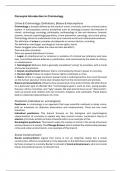Concepts Introduction to Criminology
Crime & Criminology: Definitions, Biases & Assumptions
Criminology is broadly defined as the study of crime, criminals, and the criminal justice
system. It encompasses various disciplines such as aetiology (causes and theories of
crime), victimology, sociology, philosophy, anthropology of law and deviance, forensic
science, forensic psychology/psychiatry, crime prevention, penology, and crime policy.
Criminology strives to understand crime as a nuanced social and cultural phenomenon.
The definition of crime is complex and depends on various factors, including:
The definition used (legal, sociological, human rights, harm).
Power struggles (who makes the rules and who benefits?).
Time and place (context).
There are several definitions of crime:
1. Legal: An intentional act or omission in violation of criminal law (statutory and case
law), committed without defense or justification, and sanctioned by the state as a felony
or misdemeanor.
2. Sociological: Behavior that is generally considered "wrong" by societies, with a moral
and social component.
3. Social constructivist: Behavior that is criminalized by those in power in a society.
4. Human rights: Failure to respect human rights constitutes a crime.
5. Harm: Crime is a legal construct (power!) and is anthropocentric (too much focused
on the human species). Crime also includes harm to the environment and animals.
Biases and assumptions influence how we perceive crime and criminals. We often focus
on a particular type of oSender (the "criminological gaze"), such as men, young people,
the poor, ethnic minorities, and "ugly" people. We also tend to focus on an "ideal victim",
such as women and children who are innocent, helpless, and vulnerable. These biases
lead to a distorted representation of crime.
Positivism (individual vs. sociological)
Positivism in criminology is an approach that uses scientific methods to study crime,
with an emphasis on objective observation and measurement. There are two main
branches:
Individual positivism: This branch focuses on the biological and psychological
characteristics of criminals to explain why they commit crimes. Lombroso's theory of
atavism (criminals exhibit primitive characteristics) is an example of this.
Sociological positivism: This branch seeks the causes of crime in the social structures
and processes of a society. The Chicago School, which studied the relationship between
crime and urban environments, is an example of this branch.
Social Constructivism
Social constructivism argues that crime is not an objective reality but a social
construction. What is considered a crime depends on the definitions and labels imposed
by those in power in a society. Becker's concept of moral entrepreneurs, who turn social
issues into political issues, is relevant here
, Marxism (political economy of crime)
Marxism views crime from the perspective of social inequality and class struggle. Crime
is seen as a consequence of the capitalist economy, which creates poverty and
marginalization. Crimes of the powerful, such as white-collar crime and state crime, are
highlighted as examples of how those in power abuse their position to commit crimes and
escape punishment.
Abolitionism
Abolitionism in criminology advocates for the abolition of the criminal justice system.
Since crime is a social construction, abolitionists argue that the criminal justice system
does more harm than good by perpetuating inequality and marginalization. They advocate
for alternative forms of conflict resolution and restorative justice.
Punishment: Legitimacy to Punish & Social Contract
The legitimacy to punish is a central theme in the philosophy of punishment. Weber
defined the state as the entity with a monopoly on the legitimate use of violence. The
concept of the social contract, as described by Hobbes, suggests that individuals give
up some of their freedom in exchange for protection by the state, including the right to
punish.
Punitive/ Welfarist/ Radical Types of Punishment
There are several types of punishment:
Punitive: Focused on retribution and deterrence, such as imprisonment, fines, and
corporal punishment.
Welfarist: Focused on rehabilitation and reintegration, such as community sentences,
probation, and social programs.
Radical: Focused on addressing the underlying causes of crime, such as restorative
justice, decriminalization, and abolitionism.
Deterrence (General & Special)
Deterrence is a penal goal aimed at discouraging crime. There are two types of
deterrence:
General deterrence: Aimed at deterring the entire population by showing the
consequences of crime.
Special deterrence: Aimed at deterring specific individuals who have already committed
a crime.
Retribution
Retribution is a penal goal based on the idea that oSenders should be punished for their
actions, regardless of the potential benefits to society. It is based on the principle of
proportionality: the punishment should be proportionate to the seriousness of the crime.
Utilitarianism & Rational Choice
Utilitarianism is an ethical theory which states that the best action is the one that
maximizes happiness for the greatest number of people. In criminology, utilitarianism is





